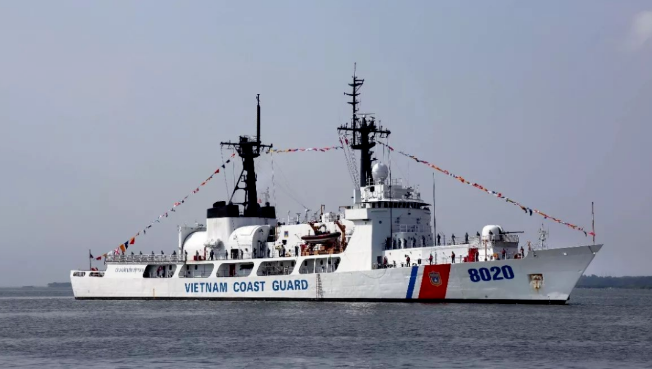By Teng Jianqun

File photo: A patrol ship donated to Vietnam by the US (Source: thepaper.cn)
Since the beginning of this year, US Secretary of State Antony Blinken and other several senior officials have successively visited Vietnam seeking to strengthen bilateral relations. US President Joe Biden's recent visit, the first of its kind since his inauguration in 2021, is seen as the conclusion of this series of diplomatic activities. The two sides announced to level up the mutual relationship twice from a comprehensive partnership to a comprehensive strategic partnership.
US' closeness with Vietnam is simply out of geopolitical considerations, aiming to craft the latter into a hook for its willful moves in the South China Sea and Southeast Asia, which is more of a demonstration of superficial politics. Furthermore, the US wishes to coax Vietnam as a partner in continuously instigating troubles in Southeast Asia by extending its token acknowledgment. Of course, Vietnam is also willing to strengthen cooperation with the US.
To woo Vietnam, the US revised the arms trade terms in 2007 to permit the sale of non-lethal weapons to Vietnam. In May 2016, then-US President Barack Obama on a visit to Vietnam announced that the US will fully lift the arms sales ban on Vietnam on the premise that "every transaction is approved". US Deputy National Security Adviser Jon Finer recently claimed that the security field is also within the scope of the US-Vietnam comprehensive strategic partnership.
The US has currently begun to tentatively provide Vietnam with non-lethal weapons including patrol boats, but it is still hesitant in supplying some lethal devices, as the national social system is different for the two countries. Obviously, US-Vietnam cooperation in the security field will be further strengthened in the future, but is difficult to go deep and solid subject to discrepancy in political systems, ideologies and other aspects, thus both sides adopt a cautious approach and remain wary.
Meanwhile, Vietnam has always been heavily dependent on Soviet and Russian weapons and equipment for many years. US officials recently indicated that their country and its partners can help Vietnam shed reliance on Russian-made equipment. These promises, however, are easy to say but hard to keep for a long time to come.
For Vietnam, the weapons and equipment provided by the former Soviet and now Russia such as fighter jets and Kilo-class submarines, cannot be abandoned as they like, which requires a certain process and huge costs. In addition, it is impossible for the Vietnam People's Army to completely discard Russian-made weapons since they have wielded these types of devices with ease. Meanwhile, Russia will also further strengthen cooperation with Vietnam in the transfer of military products, thus firmly securing its share in the Vietnam's arms market.
It is learned that Vietnam currently appears to be downplaying the importance of its new comprehensive strategic partnership with the US, stating that it intends to elevate its relations with Australia, Indonesia and Singapore to the equivalent position in recent weeks. This reflects Vietnam and other Southeast Asian countries, which always stick to independent foreign policies, are not inclined to take sides in the existing sensitive environment.
For the time being, maintaining a balance among major powers is the common choice of Southeast Asian countries. Indeed, China, the US and Russia hold considerable sway in the security as well as economic and trade fields in the relevant areas. There is a substantial risk of suffering significant losses by taking sides for the regional countries.
The former Philippine President Benigno Aquino III who adopted a policy of favoring the US by taking sides not only failed to gain security guarantees but also suffered weighty economic and trade losses. For Southeast Asian countries, sustaining equilibrium among major powers is the optimal choice for maximizing interests.
Editor's note: Originally published on cnr.cn, this article is translated from Chinese into English and edited by the China Military Online. The information and opinions in this article do not necessarily reflect the views of eng.chinamil.com.cn.













